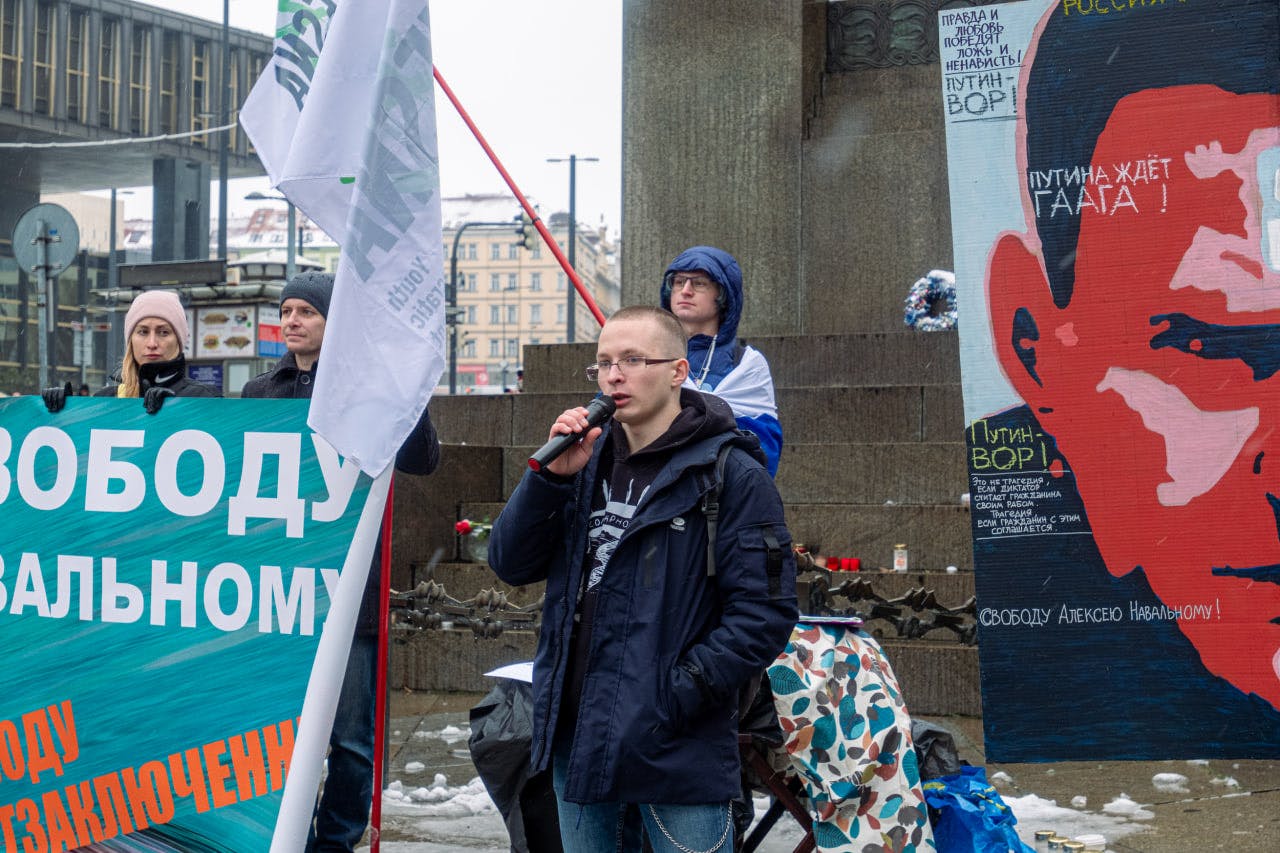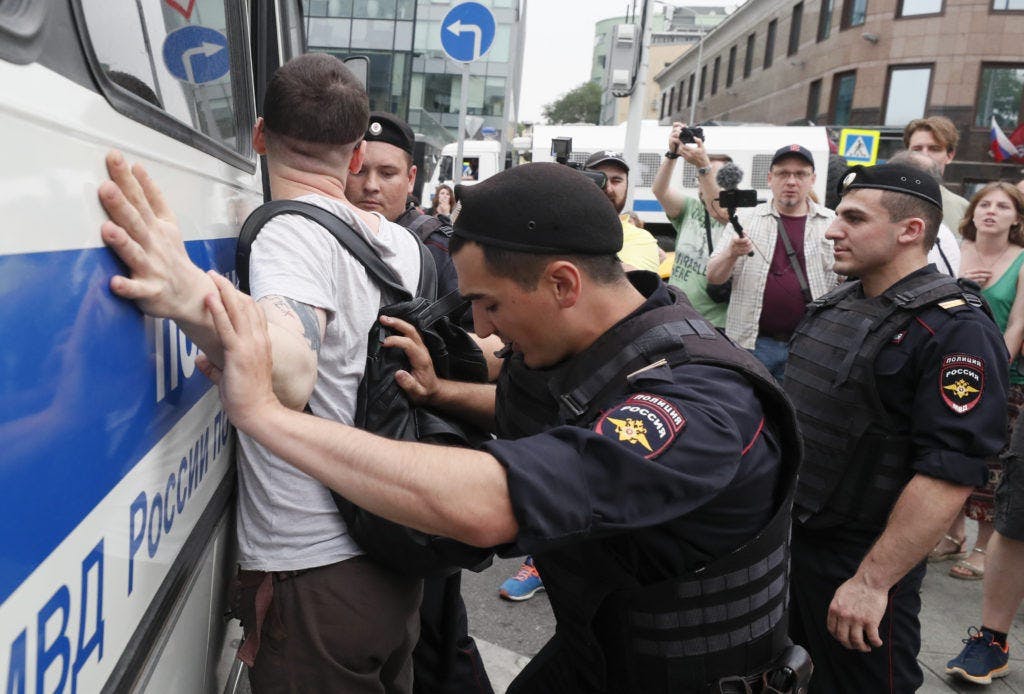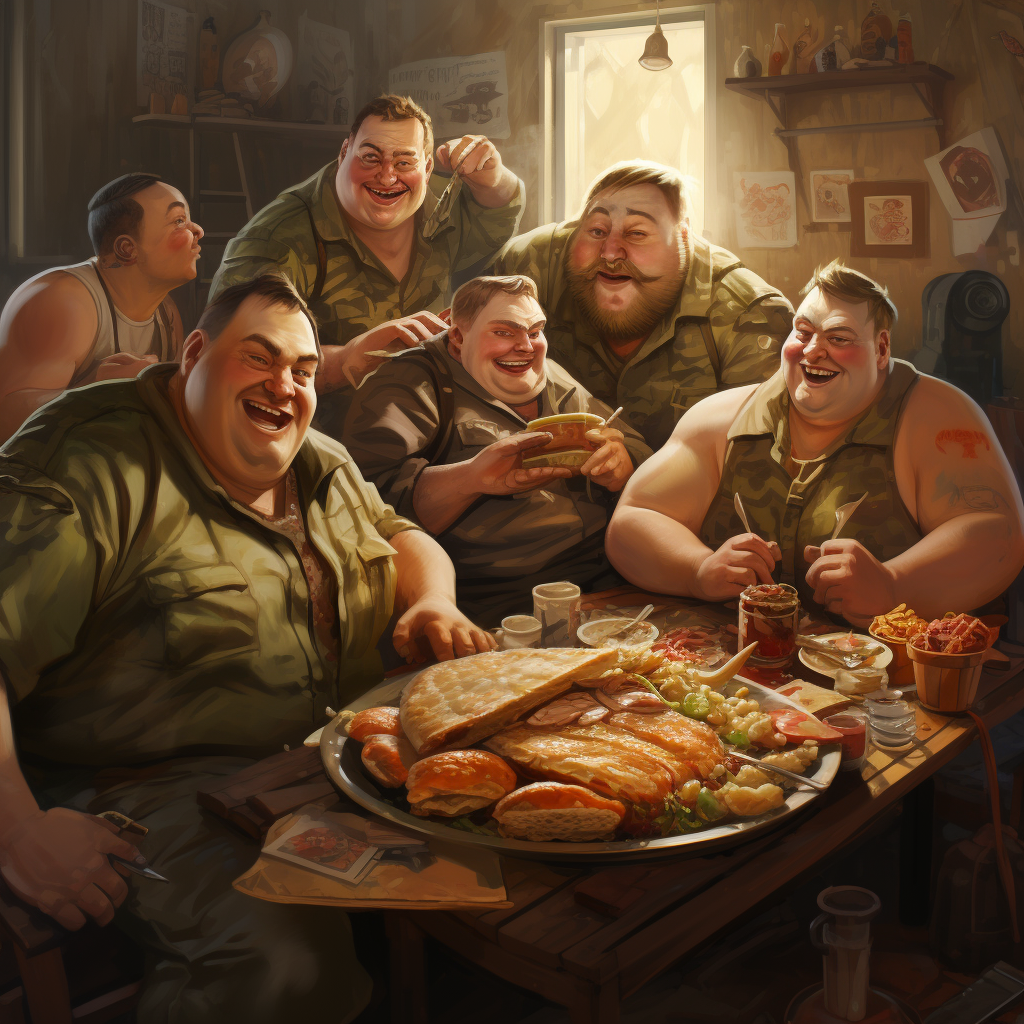Kysh (Andrei)
...Gebt nicht auf und verzweifelt nicht, tut, was ihr für richtig haltet. Russland wird auf jeden Fall frei sein.


Article 31 of the Russian Constitution guarantees the right to gather peacefully, without weapons, hold an assembly, a protest or demonstration, marсh or picket.
On December 5th, 2022, Vladimir Putin signed the law forbidding demonstrations almost everywhere. However, the trampling on the right to protest started much earlier.

Law enforcement officers detain a participant of a rally in support of Russian investigative journalist Ivan Golunov. Photo by Shamil Zhumatov/Reuters
In 2004 Russia adopted a law on protests. It introduced rules organisers and participants of public gatherings should follow. For example, organisers must inform the authorities about the protest no earlier than 15 and no later than 10 days before the day of the public event (no need if it is a one-man protest). The law also describes the places where demonstrations cannot be held (e.g. railroad lines). Overall, the first version of the law entered into force in the mid-noughties is quite similar to those in European democratic countries. The main purpose was to organise people, not to control them.
Everything changed after mass protests against the falsifications of the parliament and president elections results took place in 2011–2013.
One-man protests are allowed without notice if there are no other people involved and ‘connected by the same idea or organisation,’ and a person does not have a temporary structure (in this case the notice must be given no later than 3 days in advance). A picketer has to stay still and cannot move around.
Greatly dismayed at the arrest of journalist Ilya Azar @A3AP & today's detention of six journalists after attempted solitary pickets. #COVID19 cannot be an excuse to clamp down on #FreedomOfExpression. I call upon #Russia's authorities to release them as a matter of urgency.
The mass protests started with a few hundred people and gained at their peak 150,000 participants were followed a new law imposing penalties on protesters who engaged in unauthorised demonstrations. From that moment on, people who wished to protest had to get permission for that from the local authorities. With the average salary of 30,000 rubles, for people outside the capital, the minimum fine of 10,000 rubles could be a real dent in a wallet. What is interesting is that this law introduced a new notion of an organiser of the mass gathering which is not a public event. The organiser in this case is the person who de facto coordinates people. Later on, when local authorities stopped giving permissions for protests, and people gathered unauthorised, a prominent opposition member or a random protestor could be named an organiser just for helping people cross the street, and he or she could get a fine from 150,000 to 300,000 rubles. href
So-called ‘Hyde parks’ were supposed to become places where everyone could freely exercise their right to protest but were heavily regulated from the very beginning. Local authorities provided the places for gatherings far from city centres where protesters could not be heard. Giving people places of nominal freedom with one hand, the government took all other possibilities away with other by demanding to seek the approval of gatherings in other places. Amendments to the law on rallies introduced criteria for eligible public events. Since then, the opposition’s public events have been almost always being banned on formal grounds.
Article 212.1 of the Criminal Code on repeatedly violating the rules of organising street events entered into force in July 2014. According to this article, if a court has issued two rulings on administrative offences within 180 days, the person could be considered repeatedly violating the law. The lightest penalty under the article is a fine of 600,000 rubles, and the heaviest — 5-year jail time. In December 2015, activist Ildar Dadin was sentenced for 3 years, but in February 2017 Russia’s Supreme Court overturned the conviction, ordered his release from prison, and recognised his right to rehabilitation.
The list of amendments accepted:
In 2010, we used to write statements expressing concerns about infringement to freedom of assembly in Russia. How far we've fallen. "Statement by NSC Spokesman Mike Hammer: "Detention of Article 31 Rally Participants Raises Human Right Concerns" https://t.co/thND2w4RZX
It’s also worth mentioning that the police often use against protestors Article 318 of the Criminal Code on the violence against representatives of the power. Some criminal cases were utterly ridiculous, like persecution of Sergey Abanichev for throwing a single-serving soft drink can at a police officer.
Then they will start shooting and vandalising shops. We should not allow that,” commented Vladimir Putin on the case.
Note: Currently, the beginning of trampling on the right to protest can be seen in the UK as a response to climate activists’ bold methods.
Every country handled the pandemic differently. Russian authorities used it as a new oppression tool.
In April 2020, Vladimir Putin signed the bill into the law criminalising the violation of sanitary rules. According to the Article 236 of the Criminal Code, minimal punishment for “violation of sanitary and epidemiological rules, which through negligence caused a mass disease or poisoning of people, or created a threat of such consequences” is a fine from 500,000 to 700,000 rubles, and maximum penalty — a prison time of up to 2 years (5 years if 1 person died, and up to 7 years if more than 2 people died).
After a pro-Navalny rally that took place on January 23 in Moscow, ten opposition leader’s associates were accused of violations of pandemic restrictions. Most of them were sentenced to “restrictions on freedom”. For example, Lyubov Sobol got 18 months of “restriction”. Later on, investigators used the same article against opposition figures in Murmansk, Saratov, and Nizhny Novgorod, claiming that the posts on social media informing about the rallies were “endangering people”. For instance, Natalia Rezontova, the journalist from Nizhny Novgorod, got the “restriction of certain actions”, including the usage of mobile phone and computer, which left her unable to work.
Dieser Artikel wurde noch nicht ins Deutsche übersetzt. Wir suchen nach Freiwilligen, die uns dabei helfen können.
...Gebt nicht auf und verzweifelt nicht, tut, was ihr für richtig haltet. Russland wird auf jeden Fall frei sein.

Among individuals with left-leaning perspectives, there is often a perception that Russia leans leftward, particularly concerning workers' rights. Is this indeed the case?

Short biography of the freedom that never happened.

Unsere Medienplattform würde ohne unser internationales Freiwilligenteam nicht existieren. Möchten Sie eine_r davon werden? Hier ist die Liste der derzeit offenen Stellen:
Gibt es eine andere Art wie Sie uns unterstützen möchten? Lassen Sie es uns wissen:
Wir berichten über die aktuellen Probleme Russlands und seiner Menschen, die sich gegen den Krieg und für die Demokratie einsetzen. Wir bemühen uns, unsere Inhalte für das europäische Publikum so zugänglich wie möglich zu machen.
Möchten Sie an den Inhalten von Russen gegen den Krieg mitwirken?
Wir wollen die Menschen aus Russland, die für Frieden und Demokratie stehen, gehört werden lassen. Wir veröffentlichen ihre Geschichten und interviewen sie im Projekt Fragen Sie einen Russen.
Sind Sie eine Person aus Russland oder kennen Sie jemanden, der seine Geschichte erzählen möchte? Bitte kontaktieren Sie uns. Ihre Erfahrungen werden den Menschen helfen zu verstehen, wie Russland funktioniert.
Wir können Ihre Erfahrungen anonym veröffentlichen.
Unser Projekt wird von internationalen Freiwilligen betrieben - kein einziges Mitglied des Teams wird in jeglicher Weise bezahlt. Das Projekt hat jedoch laufende Kosten: Hosting, Domains, Abonnements für kostenpflichtige Online-Dienste (wie Midjourney oder Fillout.com) und Werbung.




Russland hat den Krieg gegen die Ukraine angefangen. Dieser Krieg dauert schon seit 2014 an. Er hat sich seit 24. Februar 2022 nur noch verschärft. Millionen von Ukrainern leiden. Die Schuldigen müssen für ihre Verbrechen zur Rechenschaft gezogen werden.
Das russische Regime versucht, die liberalen Stimmen zum Schweigen zu bringen. Es gibt russische Menschen, die gegen den Krieg sind - und das russische Regime versucht alles, um sie zum Schweigen zu bringen. Wir wollen das verhindern und ihren Stimmen Gehör verschaffen.
**Die russischen liberalen Initiativen sind für die europäische Öffentlichkeit bisweilen schwer zu verstehen. Der rechtliche, soziale und historische Kontext in Russland ist nicht immer klar. Wir wollen Informationen austauschen, Brücken bauen und das liberale Russland mit dem Westen verbinden.
Wir glauben an den Dialog, nicht an die Isolation. Die oppositionellen Kräfte in Russland werden ohne die Unterstützung der demokratischen Welt nichts verändern können. Wir glauben auch, dass der Dialog in beide Richtungen gehen sollte.
Die Wahl liegt bei Ihnen. Wir verstehen die Wut über die Verbrechen Russlands. Es liegt an Ihnen, ob Sie auf das russische Volk hören wollen, das sich dagegen wehrt.